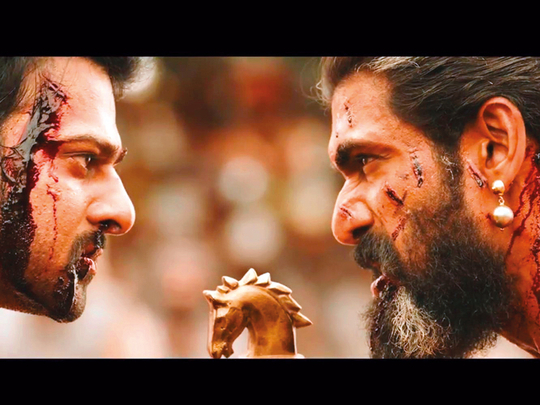
The highest earning film in India this year — Baahubali 2: The Conclusion — was neither an original Hindi movie nor featured an established star. That says a lot about the changing dynamics of a Bollywood that, in 2017, saw a mixed bag of projects that drew audiences mainly with solid content.
Salman Khan’s Tubelight, Shah Rukh Khan’s Jab Harry Met Sejal and Ranbir Kapoor’s Jagga Jasoos are cases in point. They failed to elicit the expected response despite the buzz, falling flat in a way that the Khans reportedly compensated the distributors for the losses they incurred.
There is no centralised agency to record Bollywood’s box-office numbers. But as per trade experts, while no Bollywood film has so far managed to cross the Rs4 billion (Dh230 million) mark at the domestic box office, S.S. Rajamouli’s magnum opus Baahubali 2: The Conclusion, featuring Prabhas, Rana Daggubati and Anushka Shetty, did the unexpected; it made Rs5.1 billion.
Siddharth Roy Kapur, President of the Film and Television Producers Guild of India, says Baahubali 2: The Conclusion — the sequel to hugely successful fantasy drama Baahubali: The Beginning — was a game changer as “a dubbed Telugu language film became the biggest Hindi language blockbuster of all time”.
“It really says a lot to everyone who works within Hindi cinema. It says that we can’t make any excuses. Baahubali, in conventional terms, had everything going against it. The Hindi audience has traditionally not looked at southern stars as appealing and those who featured in Baahubali had no name recognition in the Hindi market.
“Dubbed movies were always considered to be weaker at the box office because of the fact that they were not in the original language. But Baahubali has come and dispelled all those myths,” Kapur said.
Largely, it boils down to the fact that “if you give people a cinematic experience and have the confidence and the gusto and the flair to be able to tell that story uninhibitedly in the way you want to tell it, then the audience will come and watch the film”, Kapur added.
As far as Bollywood originals are concerned, nine films marched past the Rs1 billion benchmark in a year when the central government introduced Goods and Services Tax (GST); for tickets below Rs100, it stands at 18 per cent and for tickets above Rs100 at 28 per cent.
Tiger Zinda Hai turned out to be the highest grosser among Bollywood originals with a collection of Rs2 billion until December 28.
Even the team of Reliance Entertainment-backed Golmaal Again laughed its way to the bank with a collection of Rs2.05 billion.
There were others too: Raees (Rs1.37 billion), Kaabil (Rs1.03 billion), Jolly LLB 2 (Rs1.17 billion), Badrinath Ki Dulhania (Rs1.16 billion), Toilet: Ek Prem Katha (Rs1.34 billion), Judwaa 2 (Rs1.38 billion) and the latest, Tiger Zinda Hai (Rs1.73 billion and counting).
Tubelight, though not counted among Salman Khan’s hits, also went past the Rs1 billion mark; taking in Rs1.19 billion.
According to Kamal Gianchandani, CEO, PVR Pictures, Tubelight was one example of how “stars on their own are not enough to pull in audiences”.
“See Salman in Tiger Zinda Hai. It’s an established franchise but also a film with a strong nationalistic flavour and content that’s appealing to a broad section of people. It has been a respite at the box office, but see the same Salman in a long and slow film like Tubelight, which was not suitable to the actor’s image,” Gianchandani said.
“Well-drafted, well-written, well-packaged and well-presented content with a star, creates magic at the box office,” added Gianchandani, who appreciated how smaller films such as Newton and Tumhari Sulu did well.
“Each time there was a good film, the audiences came out in big numbers and supported it.”
Naam Shabana, Hindi Medium, Sachin — A Billion Dreams, Mom, Lipstick Under My Burkha, Bareilly Ki Barfi, Shubh Mangal Saavdhan, Secret Superstar and Fukrey Returns were some such titles which found a place with the audience. As always, content was king.
The movies that flopped include OK Jaanu, Rangoon, Begum Jaan, Noor, Sarkar 3, Meri Pyaari Bindu, Raabta, A Gentleman, Simran, Bhoomi, Haseena Parkar, Chef and Firangi.
Besides those, the big-ticket Padmavati, which was due to release on December 1, is tangled in a web of controversy which has kept it away from hitting the screens.
Girish Johar, film business and trade analyst, said: “Had Baahubali not been there, Bollywood would have performed poorly. Hindi films per se haven’t done great. Padmavati was supposed to release in December, but it did not, so all eyes were on Tiger Zinda Hai.
“I think we are still falling short of 10-12 per cent on the annual box-office returns, and that’s a depressing way to end the year.”
The solution, as Kapur pointed out, lies in “better stories and better scripts”.













